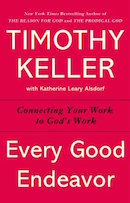Slavery and the Condescension of God
Daily Reflection / Produced by The High Calling
“If you buy a Hebrew slave, he may serve for no more than six years. Set him free in the seventh year, and he will owe you nothing for his freedom.”
Exodus 21:2
The Ten Commandments set the stage for the specific, detailed laws of the Hebrew Torah. The first of these laws addresses a master who purchases a slave: “If you buy a Hebrew slave, he may serve for no more than six years. Set him free in the seventh year, and he will owe you nothing for his freedom” (21:2).
If we’re to understand this law, we need to know that slavery was common in the Ancient Near East. It was the only means for someone who had fallen into debt to pay what was owed. Among the Hebrews, slaves were not to be mistreated. Moreover, the term of slavery was not life, but six years (21:1). Thus, in context, this law was relatively merciful to slaves.
Yet as we read the laws concerning slaves, we must surely wonder why God didn’t outlaw slavery altogether. Wouldn’t it have been better if the Lord had added one additional commandment to the ten: “You shall not have slaves”? Wouldn’t this have been consistent with the created dignity of all people? Indeed, biblical revelation points to such a truth and is ultimately responsible for the abolition of slavery in the Western world. But this leaves us with a nagging question: Why did God regulate slavery rather than abolishing it?
An appropriate answer to this question goes far beyond the scope of today’s reflection. But I do want to mention one facet of this answer: the condescension of God. In many and various ways throughout the Scripture and throughout our lives, God “stoops to our weakness.” He works in our lives and cultures without obliterating everything that is opposed to the values of his kingdom.
God's regulation of slavery reminds me of how parents might react if their daughter made friends with someone whom the parents didn’t think was best for their daughter. Ideally, the parents would want their daughter to break off the friendship altogether. But, seeing the need for their daughter’s growth, many parents would not insist that she stop the relationship. Rather, they would establish some parameters to keep the relationship in check. These rules might appear to reflect parental endorsement of the relationship, though this would not represent the parents’ true wishes.
Similarly, God allowed and regulated slavery among the ancient Hebrews. In time, his unfolding revelation would make it clear that owning another human being was inconsistent with his ultimate will. Yet God was willing to condescend, working within the fallen world to advance his ultimate purpose. At the right time, he would make it clear that in Christ Jesus there is neither slave nor free (Gal. 3:28).
QUESTIONS FOR REFLECTION: When have you experienced God’s condescension in your life? When has he stooped to your weakness? Can you think of other actions that God might regulate though they are ultimately to be abolished in his kingdom?
PRAYER: Dear Lord, I must confess my unsettledness with these laws concerning slavery. I can see how they were an advance in their cultural setting. But part of me wishes that you had simply outlawed slavery, period. I can understand your condescension. I can see how you were working within the culture of ancient Israel. But, still, I would confess to you my “rising doubt” and “rebel sigh.” Thus my prayer today takes the form of George Croly’s marvelous hymn:
Spirit of God, descend up on my heart;
Wean it from earth; thro’ all its pulses move;
Stoop to my weakness, mighty as thou art,
And make me love thee as I ought to love.
I ask no dream, no prophet ecstasies,
No sudden rending of the veil of clay,
No angel visitant, no op’ning skies;
But take the dimness of my soul away.
Teach me to feel that thou art always nigh;
Teach me the struggles of the soul to bear,
To check the rising doubt, the rebel sigh;
Teach me the patience of unanswered prayer.
Teach me to love thee as thine angels love,
One holy passion filling all my frame;
The kindling of the heav’n descended Dove,
My heart an altar, and thy love the flame.
Amen.
Note: “Spirit of God, Descend Upon My Heart” by George Croly, 1854, public domain.






